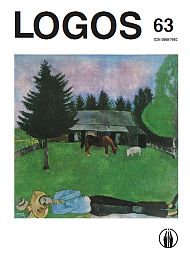Egidijus Romietis :Filosofų Klaidos
Giles of Rome: on the Errors of the Philosophers
Author(s): Dalia Marija StančienėSubject(s): Social history, Philosophy of Middle Ages, History of Education, 13th to 14th Centuries
Published by: Visuomeninė organizacija »LOGOS«
Keywords: Giles of Rome; syllabus; philosophical theology; aristotelianism; averroism;
Summary/Abstract: The creed of Giles of Rome had been formatting in the tumultuous 13th century when popes politically confronted kings; hierarchs of the Church competed with each other for the greater influence; and the academic atmosphere in Paris University was stifling because of oppressive censorship. As a disciple and follower of Thomas Aquinas Giles was interested in the problems of political power. Relaying on the Aristotelian- Thomistic tradition he had written the treatise De regimine principium dedicated to the prince, later king Philip IV. In 1270, when bishop Etienne Tempier condemned fifteen philosophical statements, of which thirteen was related to the followers of Averroes, Giles, remaining faithful to the position of Thomas Aquinas, expressed his opinion by the treatise The Errors of Philosophers. But the greatest part of his efforts he directed towards Arab philosophers. In 1277, when the syllabus, which was directed not only against pagan and Arab Aristotelianizm but also against its Christian version elaborated by Albertus Magnus and Thomas Aquinas, was repeatedly announced, Giles started fierce fight. He issued the polemical treatise Liber contra gradus et pluralitatem formarum, in which he charged the position of bishop Tempier as incompatible with the truths of Christianity. Because of that he was made to leave Paris and could return there only after the bishop’s death. The article brings to light the surroundings of Giles of Rome and analyzes the treatise The Errors of Philosophers.
Journal: LOGOS - A Journal of Religion, Philosophy, Comparative Cultural Studies and Art
- Issue Year: 2010
- Issue No: 63
- Page Range: 88-97
- Page Count: 10
- Language: Lithuanian

